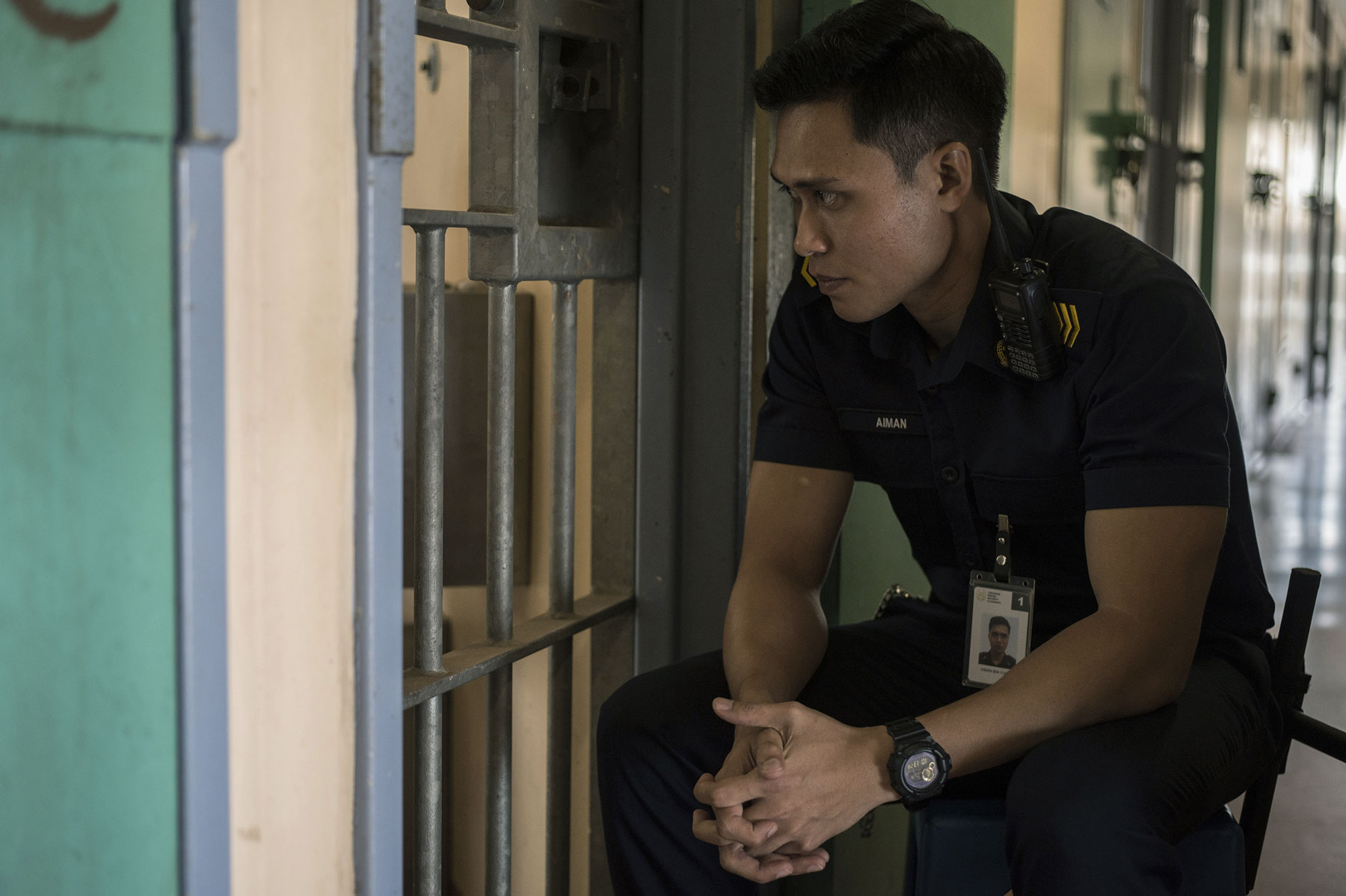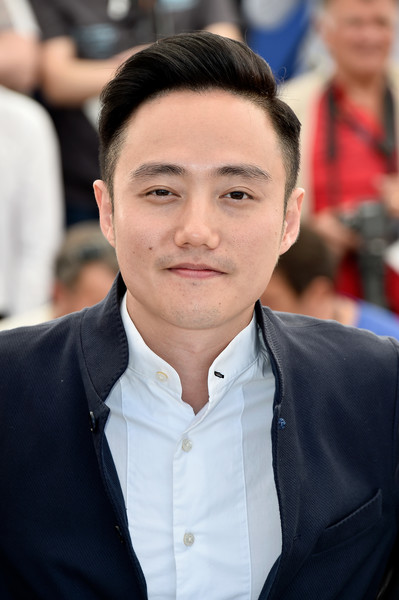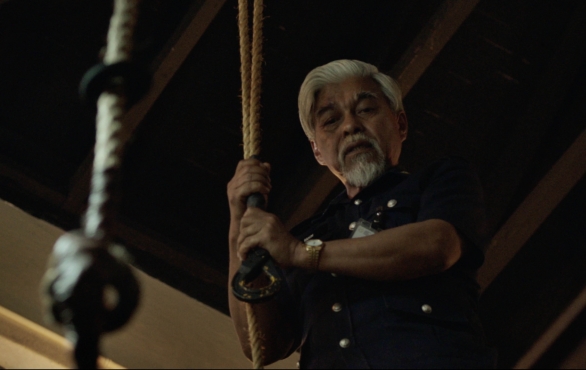Interview: Director Boo Junfeng on Why He Focused on Empathy in Singaporean Oscar Submission 'Apprentice'
 Friday, November 25, 2016 at 5:30PM
Friday, November 25, 2016 at 5:30PM

Jose here. Boo Junfeng’s harrowing drama Apprentice focuses on the fascination a young prison officer (Firdaus Rahman) develops with the Chief Executioner (Wan Hanafi Su) who becomes his mentor. Besides the unique professional bond they share, there’s also a secret about their past that lingers over their relationship. This is only Junfeng’s second feature film, and he displays the storytelling confidence of veterans. Despite the film dealing with capital punishment it’s not a film about this, but rather a complex character study which invites us to wonder why so many people make choices we wouldn’t do in a million years. The film which Nathaniel reviewed at TIFF, is Singapore’s official Oscar submission, so I spoke to Junfeng about creating the characters, casting the actors and why it’s important we watch films about dislikable characters.
Read the interview after the jump.
JOSE: You did over four years of research for this film, but why did you want to tell this story originally?
BOO JUNFENG: I remember when I was in high school I was in a debate team in class and our topic was that the death penalty was dehumanizing. Back then it was my first encounter with the death penalty, I didn’t even know what “dehumanizing” meant. This was before the internet, so I read in the library and it was all about methods, whether injections were better than electric chairs, the discourses about the cons of death penalty itself were nonexistent. This made me become more aware of the issues.
 Director Boo JunfengJOSE: One of the things the film does best is capturing the notion that even if many of us find the death penalty horrible, there are some people who want this as a job. As a writer how were you able to put yourself in the shoes of someone who wakes up knowing he will kill people at work?
Director Boo JunfengJOSE: One of the things the film does best is capturing the notion that even if many of us find the death penalty horrible, there are some people who want this as a job. As a writer how were you able to put yourself in the shoes of someone who wakes up knowing he will kill people at work?
BOO JUNFENG: During my research I met many people I never thought I’d meet, I talked to former executioners through unofficial means, through friends of friends who had some degree of connection to them. I remember when I met the first one, he was quite well known in Singapore so I had an impression of who he was, when I met him I was nervous about shaking the hand of someone who had killed hundreds of people, but five minutes into the conversation I forgot about this because he was such a likable person. I realized the character I had written by then was a caricature, for the film to work I needed to understand this person as a human being, look at his reality and see how he would rationalize having this kind of work. It took me a while to understand this person, I also read Hannah Arendt which gave me a view of how people are able to separate their jobs from them as a person. Reading her was very enlightening.
JOSE: Arts and films are going to be much more important than ever to help us create empathy.
BOO JUNFENG: Especially in times like these when the politics of the world are so divided. We’re all in our echo chambers quite often, essentially just interacting with people who share our worldview. Interacting with people with different realities was huge for me, it opened my mind to these other realities. I still am strongly against the death penalty, but it doesn’t stop me from understanding the complexities and nuances of the issue.
Can you talk about the process of working with Firdaus Rahman to prepare him for this role?
Singapore is very multicultural and multiracial, we decided to cast colorblind, even if economically it would’ve made more sense to cast Chinese speaking actors. We chose the actors who gave us the best chemistry, Wan Hanafi Su who is a veteran had great chemistry with Firdaus. Wan Hanafi Su is a very experienced stage actor, and one of the great things about stage actors is they are much more versatile and open to different processes than TV and film actors who can be very clockwork-like in their methods.

You mentioned how we often live in echo-chambers, so many people might stay away from films like yours because they don’t “speak to their beliefs”. How does this challenge the work you do?
I’d be surprised to learn that people think the film might be against what they believe, I’m against the death penalty but I didn’t want to make a film about that. In Singapore people live in comfort knowing the streets are safe, there’s a general sense of security because of the hard laws. I wanted to make a film that provided a different point of entry for people who see things differently, so they could experience the issue from the character’s point of view and reconsider the issue. In our social media society where we’re so focused on ourselves we need points of entry where we can relate to others. This is only getting more and more relevant.
Congratulations on the film being submitted for the Oscars! What are your thoughts on the awards?
It’s a miracle on its own that a film with this subject matter was selected to represent our country. It took a leap of faith for the authorities to do so and it was quite brave of them. I’m in Los Angeles to answer questions about the film, it’s quite the journey cause this is only my second film. I’m still learning about the process and it’s been very eye-opening.


Other Foreign Film Oscar Interviews
Colombia - Jose Luis Rugules on Alias Maria
Italy - Gianfranco Rosi on the prize-winning Fire at Sea
Israel - Elite Zexer on Sandstorm
Brazil - Daniel Burman on how Little Secret became Brazil's submission
Foreign Film Contender Reviews
Death in Sarajevo - Bosnia & Herzegovina | Neruda - Chile | Mother - Estonia | Elle - France | Toni Erdmann - Germany | The Salesman - Iran | Chevalier - Greece | Sand Storm - Israel | Fire at Sea - Italy | Desierto - Mexico | A Flickering Truth - New Zealand | Apprentice - Singapore | Age of Shadows - South Korea | Julieta - Spain | My Life as a Courgette - Switzerland | Under the Shadow - UK | From Afar - Venezuela
 Boo Junfeng,
Boo Junfeng,  Oscars (16),
Oscars (16),  Singapore,
Singapore,  interview
interview 


Reader Comments (3)
This movie really stuck with me so happy to see it featured here again.
If this, THE SALESMAN, SAND STORM, JULIETA and ELLE are the five nominations, it would be the best set of nominations in this category ever, and I would be over the moon.
(Of course, this means that it is highly unlikely to happen.......)
Love the love for Apprentice. I saw it in Manila and Singapore when it was shown. I like the story a lot and like Singapore as a metaphor for economy and efficiency -- it dispenses with (to me) unnecessary storylines and instead focused on the tension between the main character and the charismatic boss he works for who figured prominently in the former's dad's death.
I have not seen that many foreign films, but if it were me, I'd nominate the following for best foreign language films:
Toni Erdmann
Elle
Apprentice
Under the Shadow
Sieranevada